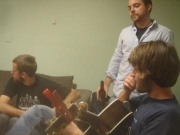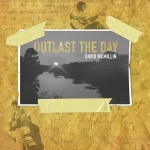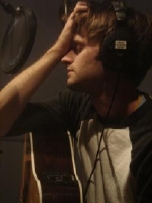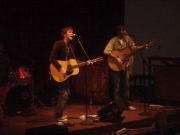|
|
|
David McMillin |
|
|
|
|
|
Indiana-native, David McMillin has been making music for a surprisingly long time in his relatively young life. Inspired by classic singer/songwriters, and supported by his music teacher parents, McMillin's musical future looks bright. Writing in the style he calls "creative nonfiction," his songs are refreshingly relatable and memorable. In the tradition of his musical influences, McMillin has been building his fanbase through extensive touring as well as taking advantage of the growing popularity of podcasting. Way Cool sat down with McMillin to talk about his newest CD, connecting with his audience, and the joy he feels in doing what he wants. |
|
|
|
|
Way Cool: |
Tell us a little bit about your background. |
| |
|
|
David McMillin: |
|

|
|
I grew up in Columbus, Indiana. I went to school in Indiana, and then moved to Chicago last summer. I just summed up 21 years in 4 seconds. I did a lot of solo stuff until I was 20. I wrote two EPs and played a lot around the Midwest. Now, I play with a band Ė with Kyle Johnson who plays keys and Aaron Kiserwho plays drums. We recorded a record at the Chicago Recording Company. We finished in October, 2006. I knew Iíd be on the road most of the time so I moved to Louisville, Kentucky where rent is cheaper than anywhere in America. Iím not home a lot, but thatís where I reside. | |
|
|
|
|
WC: |
When did you start playing guitar? |
| |
|
| DM: |
When I was 13. The first show I ever saw was Bob Dylan at the Indiana University auditorium. Two weeks later, I got a guitar; a Fender acoustic EG10 that sounded really bad. I didnít know how to play at all and thought that chords were something Iíd never have to learn...I was sadly mistaken. When I was really young, I played the cello and trumpet. It was sort of a classical background, compliments of my parents who were both high school music teachers. The records I remember around the house were Sgt. Pepperís, Dylanís Greatest Hits and one of the Beatlesí yearly compilations. I remember listening to ĎLovely Ritaí over and over again Ė that was the song. Of course, with my parentsí classical background, there was Beethoven and Bach around, which I didnít have any respect for until I grew up. But, I listened to a little of everything. I love jazz music. Obviously, what I do now is a southern folk, americana feel. In terms of songwriters I respectÖI love Ryan Adams. I love Josh RitterÖDavid GrayÖMartin Sexton. Thatís whatís playing in my car. In terms of other musicians, I think Beck is the most important musician to the music business in terms of creativity and production. Iíve been listening to the Beastie Boysí instrumental record now too. I have kind of an eclectic mix of tastes. |
| |
|
|
WC: |
When did the songwriting come in? |
|
|
|
|
DM: |
I think the first song I ever wrote was called ĎWhere I Belong.í I finished it when I was 14 when I was on vacation in France. I love writing, I love reading. But, Iíve really worked hard on becoming a better songwriter. Over the past year, Iíve been really proud of what Iíve written. Maybe itís just part of growing upÖ.songs written at 14 are all pretty bad. |
|
|
|
|
WC: |
Did ĎWhere I Belongí ever make it to a recording? |
|
|
|
|
DM: |
I recorded a solo album when I was 17, and itís on there. Iím not really proud of that recordingÖI donít like to listen to my records. I listen to our live recordings to see where I or the band could do better. I feel like recordings are like photographs, and I donít really like looking at photographs either. I just like to say, ďThatís where I was at 22.Ē Now, Iím looking forward. |
|
|
|
|
WC: |
How is the tour going so far? |
| |
|
|
DM: |
|
Itís going really good so far. Iím not home very much at all. I was home for most of January. We released Outlast The Day in November so Iíve been on the road on-and-off since then. Weíve been getting some great opportunities. I played in Colorado recently, and I hadnít been there much before so itís very rewarding to see the hard work paying off. |
|

| |
| |
|
|
WC: |
How have people responded to the songs from Outlast The Day? |
|
|
|
|
DM: |
Easily, the favorite is ĎAnnabelle.í I recorded half of what I thought it would be in July and I was really unhappy and threw it all away. I wrote everything new. And, it really pays off. ĎAnnabelleí was the song that pushed the record to come together. That was the beginning of my being really happy that it could be cohesive. ĎLong Time Leavingí and ĎThe Least I Could Doí are favorites as well. Iím really proud of the record, but Iím ready to record a new one. I hope, by early fall, weíll have finished a new record. |
|
|
|
|
WC: |
So, is Annabelle a real person? Has her name been changed to protect her privacy? |
|
|
|
| DM: |
I call her ďAnnie,Ē but sheís a real person. Sheís from Southern Indiana too. She lived in Chicago last summer when I was there. We spent lots of time walking down Clark Street together. Sheís very much real. Everything on the record is based in non-fiction.
Thereís a song called ĎShot Guní that Iím personally attached to. Itís kind of a departure from what the rest of the record is about. I have a friend who is oversees fighting in Iraq. I donít play it live; I donít think I ever played it live. In the process of recording, we heard a news story about North Korea testing a nuclear bomb. I had 3 verses already written, and wrote the last as a response to the news. We were almost done with the record, but took 15 more minutes to record it before we all too tired. So, I really like that song. |
| |
|
|
WC: |
Do you think youíll ever play it live? |
| |
|
|
DM: |
I probably will sometime. I donít know when. It will have to be the right setting. |
|
|
|
|
WC: |
Youíll get a request for it. It will be the song that someone attaches himself to. Hopefully, you wonít be like other musicians, and youíll actually play it. |
| |
|
| DM: |
Iíd let somebody else write the set list every night if they wanted to! I believe very much that songwriting is a privilege. And getting to tour is an even bigger privilege. I just really want to connect with people. |
| |
|
| WC: |
Do you find that you are building an audience? |
| |
|
| DM: |
Yeah, Chicago and Indianapolis are really good to us. New York, Atlanta, Charlotte are all good markets. The Southeast is my favorite place to play. They seem more receptive to acoustic music. I feel lucky to be doing this, and it seems to be paying off. |
| |
|
| WC: |
A lot of your songs involve the concept of travel and moving on. How do you balance wanting to be both on the road and at home? |
| |
|
| DM: |
Itís weird. You spend time wanting to home when youíre on the road, and then as soon as you get home, you ache to be on the road again. A lot of what I write about is about the search about what ĎhomeĒ really means. Some people get really tired and frustrated being on the road so much. Itís not an easy lifestyle. But, right now, Iím getting to do what I want to do, which not a lot of people can say. Iím inspired every day. Writing comes best when Iím home. |
| |
|
|
WC: |
Have you picked up any pre-show rituals? |
|
|
|
|
DM: |
Iím always really nervous before a show. Every night is kinda different. I like to relax and have five minutes of silence, but thatís really it. Another good thing about traveling is that you get to meet someone new every day; see somewhere new every day. Thereís beauty in every city. Itís a really lucky thing that I do. I lose a guitar stand after every showÖitís not a ritual, but it is frustrating. |
|
|
|
|
WC: |
What have you done to get your music out there? |
|
|
|
|
DM: |
|

|
|
Everything is on iTunes. Podcasts have become such a big thing. But, really what it takes is working the road really hard. The only way to do it is travel. If you find an audience who likes you, you go back. Itís a very grassroots thing. Iím lucky to have a lot of really supportive friends who also work on a street team for me. Like I said, itís a privilege to be doing this. | |
| |
|
|
WC: |
Are you hoping for placement on Greyís Anatomy or on Scrubs or the like? |
|
|
|
|
DM: |
Iím just hoping to be lucky enough to play music every day of my life - whether that comes from playing every night for the next five years or getting a song on a TV show. Every musician hopes for a break, but hope only does so much. Hard work does the brunt of the work. |
|
|
|
|
WC: |
You are quite young yourself, but how will it feel to be the old man on tour when you are out with Kyle Riabko (18 years old)? |
|
|
|
| DM: |
|
It is weird to feel like youíre old. Thatís a good question. But, Kyle is a veteran of working the road. Heís a very good friend, and is a pleasure to be out traveling with. I feel like we learn a lot from each other. The promoters make a point of saying, ďJust donít let Kyle drink.Ē |
|

| |
| |
|
|
WC: |
How do you distinguish yourself from the other singer/songwriters on the scene today? |
|
|
|
|
DM: |
Iím a songwriter, but I donít care about the label. There are David McMillin records out there, but I play with a band now. I donít really care about the name recognition thing at all. Iím very proud of being able to write songs. But, everyone who calls themselves a singer/songwriter finds a way to stick out. Iíd rather people not come to see me play who are used to the quiet singer/songwriter room. To me, the atmosphere isnít really my scene. Itís cool that people listen, but itís got to be entertaining too. Itís a crowded genre. But, the really, really strong songwriters, the ones who are doing what they love, really come across on-stage. |
|
|
|
|
WC: |
What would your band name be? |
|
|
|
|
DM: |
The Hopewells. I think the next record will be David McMillin and The Hopewells, and then the next just The Hopewells. You can call me whatever you want. Iím really fortunate to be playing with amazing musicians, and they deserve just as much credit. |
|
|
|
| WC: |
Do you consider yourself a success now? |
| |
|
| DM: |
Iím doing what I love to do, so yes. This isnít easy. Musicians stretch dollars pretty far. The less you have to stretch is great. A lot of people donít get to do what they love. If you get to do what youíre passionate about, I donít really think thereís a lot more you could ask for out of life. |
| |
|
|
WC: |
Now itís time for seven questions. |
|
|
|
| |
|
|
|
|

|
|
|
|
|
What's the worst job you've ever had? |
|
|
I sold kitchenware at an outlet mall when I was in high school |
| |
|
|
|
What's your favorite movie quote or song lyric? |
|
|
ďDreams are like movies, but movies are films about ghostsĒ Ė Counting Crows |
| |
|
|
|
Who would you want to star in the movie of your life? |
|
|
Mark-Paul Gosselaar |
| |
|
|
|
What's your favorite TV theme song? |
|
|
Happy Days |
| |
|
|
|
If you were a superhero, what would your name be? |
|
|
Mr. Schizz |
| |
|
|
|
What do you want to be when you grow up? |
|
|
I donít really want to grow up. When I grow up, I want to be a kid. |
| |
|
|
|
Finally, why are there so many songs about rainbows? |
|
|
People are always searching for a reason to hope. | |
|
|
|
|
|
|
|
To find out more information about David McMillin. visit his website at www.myspace.com/davidmcmillin. |
|
|
|

